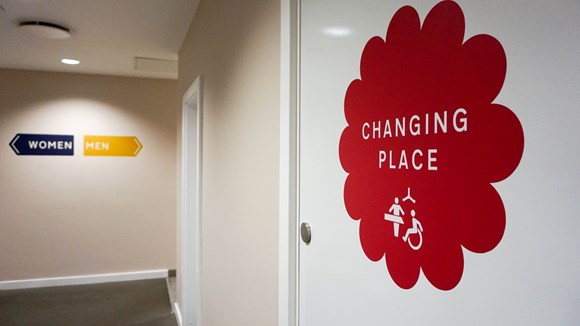Disabled passengers set for more accessible journeys at sea
Journeys by sea for thousands of disabled passengers are to be improved thanks to the Government issuing new guidance on improving accessibility to operators.

|
| Journeys by sea for thousands of disabled passengers are to be improved thanks to the Government issuing new guidance on improving accessibility to operators.
Maritime Minister Nusrat Ghani announced the publication of the Passenger Rights toolkit during a visit to Liverpool today (Wednesday, January 22) where she met key stakeholders including Mersey Maritime, Wirral Waters and Port of Liverpool. The toolkit provides operators in England and Wales with a high-level guide on what they must do to comply with passenger rights regulations, as well as recommendations on how maritime transport can be made more accessible. It will apply to services such as ferries operating from Liverpool and makes recommendations on how maritime transport can be made more accessible to make journeys better for disabled passengers and staff.
The toolkit covers the whole journey experience, from accessing information at the booking stage through to arriving at the final destination. It highlights the challenges disabled people can face in travelling by sea, whether their disabilities are visible or hidden. Maritime transport already benefits from comprehensive passenger rights regulation and this is enforced by the Maritime and Coastguard Agency (MCA). The toolkit provides guidance to support the regulations and will help industry to comply with them. The Maritime and Coastguard Agency (MCA) conduct inspections on operators and ports to ensure compliance with passenger rights regulations and they can be prosecuted in the courts and fined if they don’t comply.
At the end of 2018, the MCA carried out its first survey of disabled passengers’ experience when travelling by sea and the results were used to inform the recommendations made in this toolkit. The department worked closely with the Disabled Persons Transport Advisory Committee (DPTAC) and industry representatives including the UK Chamber of Shipping and British Ports Association in its development. The development of the toolkit was a commitment in the Inclusive Transport Strategy, which was published in July 2018. It sets out the Government’s ambition for disabled people to have the same access to transport. It’s everyone’s journey It’s everyone’s journey is a communications campaign developed by the Department for Transport in association with disability, transport and charity partners. The campaign aims to improve the public transport experience for disabled people by creating a more considerate and supportive travel environment. If you’re interested in learning more about ‘it’s everyone’s journey’ or becoming a campaign partner, visit gov.uk/everyonesjourney follow @IEJGov or email everyonesjourney@dft.gov.uk.
Driving Mobility is the National Voice for assisted driving and independenceDriving Mobility accredits a network of 20 driving assessment centres covering the whole of the UK. Many with outreach facilities, these centres include independent charities and NHS centres which offer professional information and assessment so disabled and elderly people can gain or retain independence. |
Disabled people to benefit from better journeys thanks to service station funding
Journeys will be easier and more comfortable for disabled people with more than a third of motorway service stations set to have Changing Places toilets.

- Government awards 22 Motorway Service Areas funding for Changing Places toilets
- Second round of funding, extended to include A-Roads, launched by Department for Transport
- Next in series of improvements by the Secretary of State for Transport to create a more accessible transport network, helping disabled people travel safely and with confidence
Journeys will be easier and more comfortable for disabled people with more than a third of motorway service stations set to have Changing Places toilets.
The Department for Transport, in partnership with Muscular Dystrophy UK (MDUK), has today announced the 22 Motorway Service Areas that have been successful in their bid for a share of Government funding for Changing Places toilets.
A second round of funding is now being launched, this time extended to include A-roads, with operators of service stations on these routes, as well as on motorways, invited to bid.
A quarter of a million people cannot use standard accessible toilets and need access to Changing Places facilities, which have more space and equipment. This includes adult-sized changing benches and hoists, allowing people with conditions like muscular dystrophy and cerebral palsy to use the bathroom safely and comfortably.
Transport Secretary Grant Shapps said:
“In a modern country, everyone should be able to travel.
“Despite improvements in some areas, we need our roadside services to be better for the quarter of a million people who cannot use standard accessible toilets.
“This is why we would like to go even further by extending this to the trunk road network. I encourage as many operators as possible to apply for funding, to open up our road network to everyone who wants to use it.”
Accessibility Minister Nusrat Ghani said:
“I am delighted to be awarding nearly £750,000 to bring Changing Places toilets to 22 more service stations, helping ensure that everyone can use our roads easily and comfortably.
“This is one of the commitments set out in our Inclusive Transport Strategy, an ambitious piece of work to complement the UN’s sustainable development goals – helping make the world more inclusive for disabled people.
“However, we know there is more to do which is why we are working hard on ensuring our wider transport network – not just roads, but railways, buses, aeroplanes and ferries too – is open to all.”
The DfT’s £2m partnership with MDUK was announced last November to bring Changing Places toilets to more motorway service areas.
The fund was launched in April and motorway service area operators submitted their proposals for 50 per cent funding support for specific new Changing Places toilet installations, which are expected to be ready by the early 2020s.
MDUK worked with the DfT to allocate funding which will support each individual operator’s building work and equipment to add Changing Places toilets alongside other accessible facilities within their service stations.
Catherine Woodhead, Chief Executive of Muscular Dystrophy UK, which co-chairs the Changing Places Consortium, said:
“Too many disabled people and their families are excluded from doing things that others take for granted because there are not enough Changing Places. We’re delighted that, thanks to the DfT’s funding, 22 service stations will be installing these facilities.
“This will make it easier for a quarter of a million people to go on holiday, enjoy a day out with friends, or simply visit the shops.
“We won’t stop campaigning until every service station in the country has a Changing Places toilet, and we would encourage businesses who haven’t done so already to apply for funding in the next round of applications.”
The investment is part of the government’s Inclusive Transport Strategy which aims to provide equal access to the transport network by 2030, with assistance if physical infrastructure remains a barrier.
Published in 2018, it set out key commitments to improve disabled people’s access across all modes of transport by 2030. Achievements so far include:
- A commitment to extend the Access for All programme with an additional £300 million, delivering improvements at a further 73 stations between 2019 and 2024.
- The introduction of the first ever impartial and independent Rail Ombudsman, making sure passengers are heard and that they get a fair deal when train companies fall short.
- The extension of the Blue Badge eligibility criteria to include people with non-visible disabilities.
The Government announced in May proposals for new, or majorly refurbished, large buildings used by the public to have Changing Places toilets for severely disabled people. This could add the toilets to more than 150 new buildings a year, including shopping centres, supermarkets, cinemas, stadiums and arts venues.
The Changing Places application portal will be open until December.
The 22 successful Motorway Service Area operators are:
| Motorway Service Station | Motorway | County |
| Moto rugby | M6 | Warwickshire |
| Knutsford Services NB | M6 | Cheshire |
| Ferrybridge Services | M62 | West Yorkshire |
| Reading EB | M4 | Berkshire |
| Heston WB | M4 | Greater London |
| Hilton Park SB | M6 | Staffordshire |
| Strensham North | M5 | Worcestershire |
| Tibshelf South | M1 | Derbyshire |
| Tibshelf North | M1 | Derbyshire |
| Taunton Deane North | M5 | Somerset |
| Strensham South | M5 | Worcestershire |
| Sedgemoor | M5 | Somerset |
| Rownhams South | M27 | Hampshire |
| Northampton South | M1 | Northamptonshire |
| Northampton North | M1 | Northamptonshire |
| Maidstone | M20 | Kent |
| Durham | A1(M) | County Durham |
| Clacket Lane West | M25 | Surrey |
| Chester MSA | M56 | Cheshire |
| Gloucester NB | M5 | Gloucestershire |
| Tebay SB | M6 | Cumbria |
| Birchanger | M11 | Essex |
